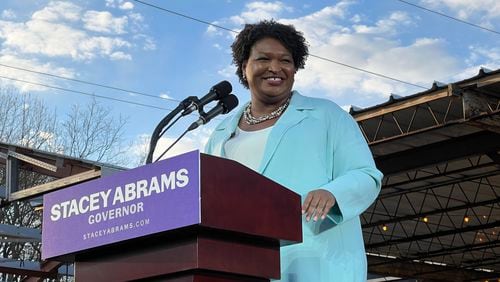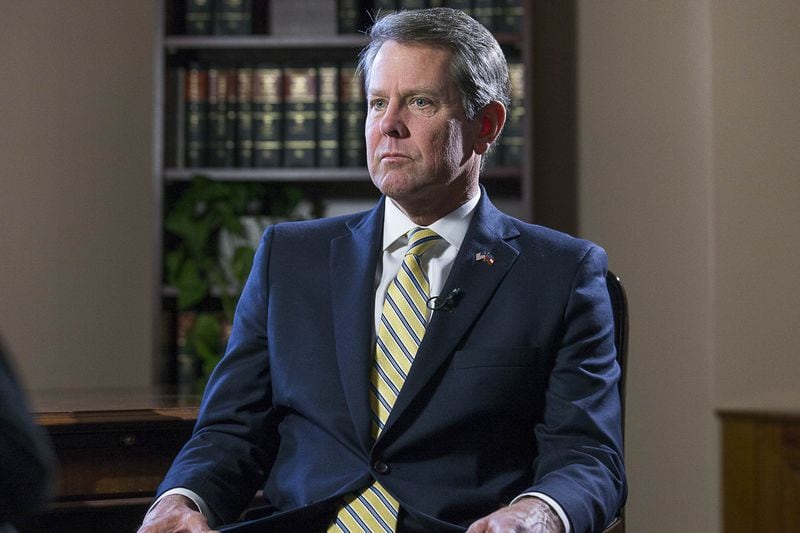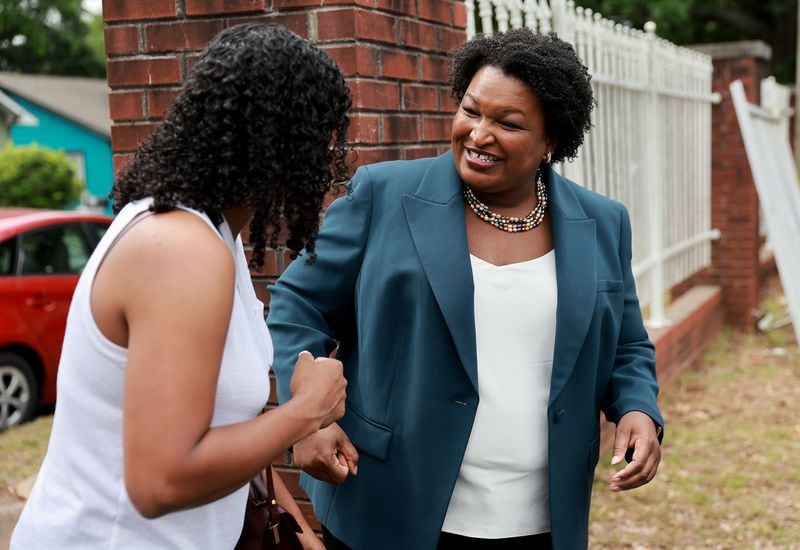Stacey Abrams said Wednesday that she would support legislation that would protect the right to an abortion before the point of fetal viability if she’s elected the state’s first Democratic governor in decades.
Abrams told The Atlanta Journal-Constitution that she intends to pass legislation that enshrines a woman’s right to an abortion, “and that right continues until a physician determines the fetus is viable outside of the body, except in the case of protecting the woman’s life or health.”
It’s the clearest definition yet from Abrams on her plan to scuttle Georgia’s anti-abortion law since the U.S. Supreme Court eliminated the constitutional right to the procedure last week in a decision that overturned the landmark Roe v. Wade ruling.
When pressed about whether she supported limits on abortions in earlier interviews, Abrams said it was a medical decision that should be left to the woman, her physician and her family.
Her remarks come as Gov. Brian Kemp, her Republican opponent, and his allies ratchet up attacks that claim she supports late-term abortions because she previously refused to sharpen her position.
The question of viability is at the center of legal clashes over abortion rights. The Supreme Court legalized abortion nationwide in its Roe v. Wade ruling by striking down restrictions in many states. A 1992 decision affirmed that states can’t block abortions before viability, generally considered by physicians to be about 23 weeks into a pregnancy.
Both those cases were reversed last week by the conservative majority on the Supreme Court, a decision that intensified the debate over abortion rights in Georgia and raised political risks for Kemp and other Republican candidates.
An AJC poll in January showed about 68% of Georgia voters opposed overturning Roe, including about 43% of Republican respondents. Asked specifically about the state’s restrictive anti-abortion law in 2019, voters were more closely split.
‘A medical decision’
If elected, Abrams would still have to negotiate with a Legislature that’s poised to remain in Republican control. She predicted “the ire and voting power of the women of Georgia” will help speed a political shift on the debate.
In the interview, Abrams said she steered clear of a specific time limit because of the ever-changing science around fetal care.
“We have to set the conditions, but we cannot use timelines to determine whether a medical decision can be made to save the life and health of a woman,” Abrams said. “It has to be a medical decision, not a political decision.”
She peppered her remarks with attacks against Kemp and his allies, saying she was loath to clarify her stance on abortion limits earlier because the focus needed to be on the Republican’s “extreme and dangerous ban.”
Credit: AJC
Credit: AJC
“It has been important to me that we didn’t allow the conservative talking points to overwhelm the reality that so many Georgia women are going to face,” Abrams said, “and that is a six-week ban that takes effect before they know they’re pregnant.”
She’s referring to an anti-abortion law championed by Kemp that would block abortions as early as six weeks. The law, pending in federal court but expected to take effect within months, includes exceptions for rape and incest, as well as “medically futile” pregnancies.
A political squeeze
Abrams’ stance carries political risks. Her support for limits may alienate liberal supporters who back a more expansive abortion rights policy. And it won’t stop Kemp’s allies from casting her as an extremist on the issue.
But Republicans are facing their own internal strife. Kemp is under pressure from conservative officials and advocates to support abortion limits that go beyond the restrictions embedded in the 2019 measure he championed.
Kemp’s aides say he personally supports banning abortion with an exception only if the life of the mother is at stake. They say he’s not planning to push new abortions restrictions and instead will focus on implementing the 2019 law, which he has frequently called one of the “toughest” in the nation.
The governor declined to comment about his stance at a Tuesday event, but Kemp spokesman Tate Mitchell said: “Unlike Stacey Abrams, Brian Kemp doesn’t need to get new polling back to determine where he stands on life. For the umpteenth time in this race, Abrams and her campaign have tried to erase her extreme agenda because they know voters aren’t buying it.”
Abrams, meanwhile, predicted the court’s ruling will reframe the election in Georgia and help mobilize abortion rights supporters to rush to the polls in November.
“My issue and my interest is how do we protect the lives and the safety and the health and welfare of Georgia’s women,” she said, “because Brian Kemp has no interest and has demonstrated no compassion or fealty to the needs of the women of Georgia.”
Excerpts from the AJC interview with Abrams
On whether she supports limits on abortion:
“If we’re talking about how we reverse this law and create new laws, I’m happy to have that conversation. But for the last few days the focus needed to be very specifically on Brian Kemp’s extreme and dangerous ban. It has been important to me that we didn’t allow the conservative talking points to overwhelm the reality that so many Georgia women are going to face and that is a six-week ban that takes effect before they know they’re pregnant. …
“That said, should I become governor and have the opportunity, my intention is going to be to pass legislation that says a woman has the right to an abortion. And that right continues until a physician determines the fetus is viable outside of the body, except in the case of protecting the woman’s life or health.”
On why she supports viability, and not a specific timeline, as a threshold:
“That’s the danger of setting a time limit. Part of the intention on the side of the anti-abortion community is to create these numbers that then stop it from being a medical decision. We know that women face very different challenges, and that the issue has to be one a doctor decides, not that the Legislature sets an arbitrary deadline to say a medical decision can or cannot be made. We have to set the conditions, but we cannot use timelines to determine whether a medical decision can be made to save the life and health of a woman. It has to be a medical decision, not a political decision.”
Credit: TNS
Credit: TNS
On how her stance has changed over the years:
“I understand the concerns that people are raising. But almost unequivocally we come to the same position (in discussions around the state): This is a health care decision. By being able to talk about the very real religious and moral concerns that some may have, I don’t dismiss them, but I make sure that I contextualize them. The law is not an instrument of our religion. And when it comes to abortion care, this is a medical issue. And when we frame it as a medical decision, when we talk about the fact that women’s lives are in danger in Georgia, that Black women in particular face extreme danger under this law and under this governor, I have seen resounding responses particularly from communities that would be considered anti-abortion. And they’re not.”
On her message to Georgia businesses concerned about the state’s anti-abortion stance:
“There have been a number of companies that have offered financial support and moral support. I encourage every company and every woman to prioritize the lives and the safety of women in this state. My hope is that we don’t have to see an exodus from companies because we can elect a governor who can reverse this law. We need every business and everyone to do what they need to protect themselves and protect their employees from the danger that Brian Kemp poses.”
On whether President Joe Biden and the Democratic-controlled Congress are doing enough to preserve abortion rights:
“The federal government is taking all the actions it can, it’s trying to figure out what else it can do. But my focus is on the state of Georgia and the fact that we have a governor who has put women’s lives at risk. He has refused to expand Medicaid. He has refused to save hospitals. He has done precious little to help children once they get here. … My issue and my interest is how do we protect the lives and the safety and the health and welfare of Georgia’s women because Brian Kemp has no interest and has demonstrated no compassion or fealty to the needs of the women of Georgia.”
About the Author











